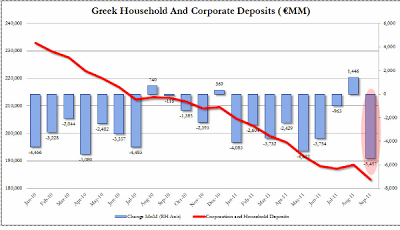Mish s Global Economic Trend Analysis Next Phase of Sovereign Debt Crisis; Greek 2Year Yields Top
Post on: 16 Март, 2015 No Comment

Next Phase of Sovereign Debt Crisis; Greek 2-Year Yields Top 20%; Greece Denies Restructuring Plan; Why the Denial?
A Greek newspaper reported that Greece is in talks with the IMF regarding debt restructuring. However, Greek Finance Minister issued this denial Restructuring is not an issue were discussing.
Last week, the media went gaga over a no-news announcement from German officials that restructuring was on the table. It should not have caused a stir because anyone watching the market knows perfectly well a restructuring is coming. Denials from Greece cannot stop it.
Why the Denials from Greece?
Inquiring minds are likely asking Why does Greece insist it will not restructure?
The answer is simple: Greek public pension plans are loaded with Greek sovereign debt garbage. A restructuring would shatter the values of those plans and the expected payouts to the pensioners.
However, the market does not care what Greek or IMF officials think. Nor does the market care about those pension plans. A yield of 20.34% on the 2-year government bond is proof enough.
This is what happens when the market takes matters into its own hands.
Greek 2-Year Sovereign Debt Yield
Greece Denies Restructuring Plan
Greece said it has no plans for a debt restructuring even as German officials openly discuss the possibility and investors charge a record amount to insure the countrys obligations.
Restructuring is not an issue were discussing, Greek Finance Minister George Papaconstantinou said in an April 16 interview in Washington. The pain and the cost of doing so would be greater than repaying lenders, he told reporters the same day.
Traders are betting on a default. The cost of insuring Greek sovereign debt jumped 56 basis points today to a record 1,211 points, according to CMA prices for credit-default swaps. That indicates theres a 64.5 percent probability of default within five years.
Greeces aid program was designed on the assumption that the country would repay debt rather than restructure, and nothing has changed, Strauss-Kahn said as he hosted the IMFs semi-annual meetings in the U.S. capital. Lagarde said April 14 at the same talks that there is no discussion about debt restructuring, none whatsoever.
Greek newspaper Eleftherotypia reported today that Papaconstantinou brought a request to extend the maturities of all the countrys debt to a meeting of European Union finance ministers in Hungary on April 8-9 and to representatives of the EU, European Central Bank and IMF who visited Athens in April. A Finance Ministry press officer in Athens, who declined to be identified citing government policy, denied the reports.
The Wall Street Journal reported that IMF officials believe Greeces debt burden is unsustainable and should be restructured. William Murray, an IMF spokesman, said yesterday that there is absolutely no truth to the report. German Finance Ministry spokesman Bertrand Benoit declined to comment today. Next Phase of Sovereign Debt Crisis
In Finland, a strong showing by the anti-euro True Finns party in Sundays national election raised fears that the country of 5.4 million could slow or even block a pending European UnionInternational Monetary Fund bailout package for Portugal.
Meanwhile, a Greek newspaper reported that Greece has asked the IMF and the EU to begin talks on restructuring its debt. A Finance Ministry spokesman subsequently told Reuters that the report wasnt true.
We seem to be moving into the next phase of the sovereign-debt crisis in Europe where debt restructuring comes to the fore, said Kathleen Brooks, research director at Forex.com. This is going to be the most painful part of the crisis, and although it will most likely be played out in the credit markets, it has the ability to disrupt the euro as we have seen in recent days. Ireland Denies Default Concerns
Irish Prime Minister Enda Kenny said the nation wont default on its debt as he tries to rebuild confidence at a time when investors speculate Greece may struggle to pay back its borrowings.
The Greek government will obviously deal with this problem in the best way it can, said Kenny, 59, in an interview with Andrea Catherwood on Bloomberg Televisions Last Word in London today. We have no intention of defaulting. Weve made that perfectly clear. We want to continue to pay our way.

Kenny said Irelands government has plenty of time before interest payments due in October or November to demonstrate the seriousness of intent about tackling the countrys banking and fiscal problems.
We believe that growth projections and initiatives that were taken will lead Ireland to a position where we fix whats been broken and generate economic growth, he said. Irish citizens voted overwhelmingly for change. Kenny has to be a huge disappointment. Once again the only country that handled matters correctly was Iceland. Voters rejected Icesave a second time. Please see Icelandic Voters Reject Icesave Again, Effectively Telling UK and Netherlands Banks Go to Hell; Iceland’s Common Sense Stance
Icelandic voters want no part of Icesave. Even the name IceSave is preposterous. Iceland was save by the fact voters rejected Icesave. Icelanders would have been debt-slaves for decades had they accepted the original terms.
How many times do citizens have to say no? Hopefully voters give Prime Minister Johanna Sigurdardottir a well-deserved boot in the next election. My ending statement in that piece was Banks that make stupid loans should suffer for them, not taxpayers. So far, Iceland is the only country that has taken this common-sense stance.
The word banks might be better phrased as people, although both statements are true.
Depositors chased high yields in Irish banks that went under. Deposits are loans to the bank. Those loans, as depositors found out are not risk-free.
It does not matter whether poor loans are made by banks, individuals, or governments. Those who chase yield or make loans in general, have default risk. In this case, the UK government foolishly decided to guarantee those deposits and now the UK government (UK taxpayers) are on the hook for the losses.
The citizens of Iceland did the right thing. I commend them for refusing to bailout private citizens and/or foreign governments for making poor loans.
This mess will undoubtedly be settled in international court.
Mike Mish Shedlock
globaleconomicanalysis.blogspot.com














